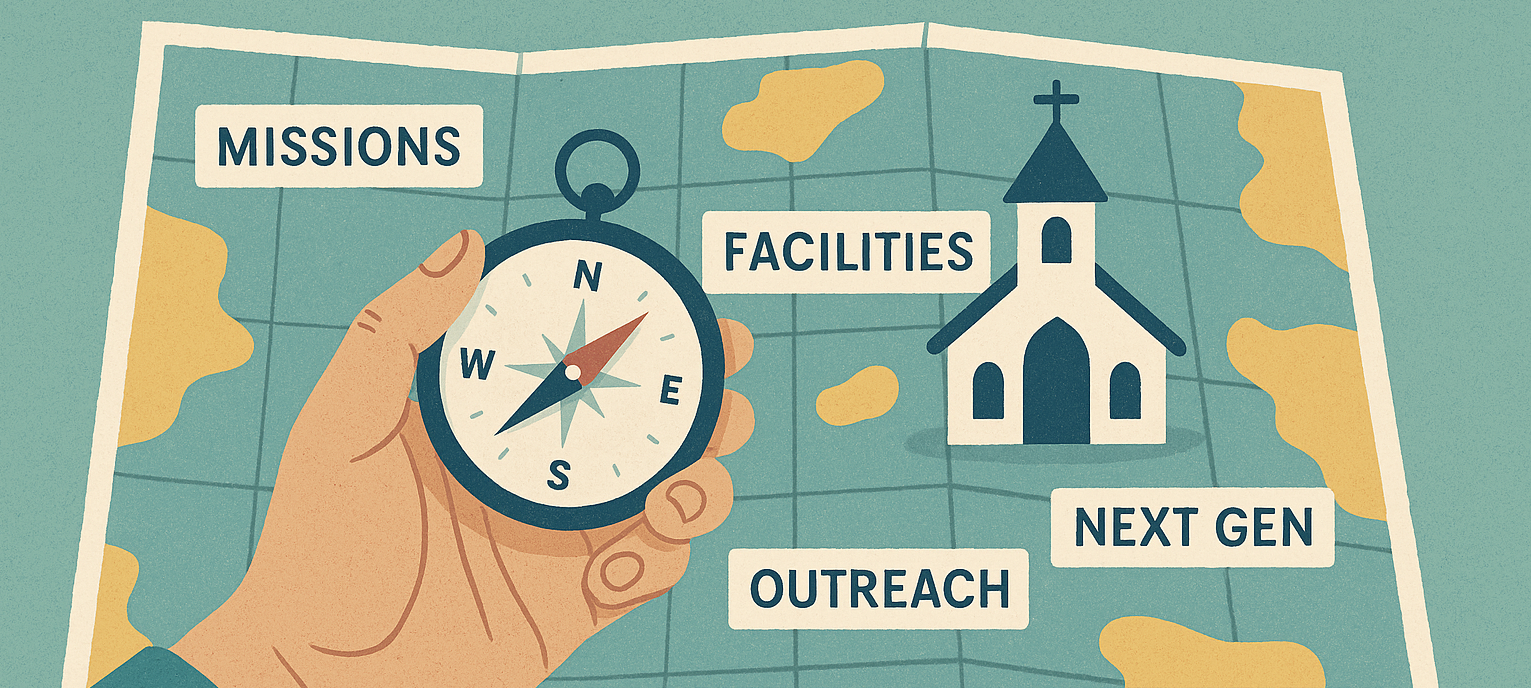How do most people physically interact with your church for the first time?
Chances are someone new to the neighborhood didn’t call and schedule a meeting with you. While a few might have met you through counseling or a chance encounter, that’s the exception, not the rule. Nearly everyone experiences your church culture through one of your events. Yes, Sunday morning is the biggest draw, but it’s more than that—think men’s breakfasts, women’s teas, fall festivals, and outreach events. In other words, your mission is primarily experienced through planned gatherings.
Don’t Overlook Your Event’s WHY
Given that events are pivotal to executing your mission, it’s no surprise we’re dedicating two posts to this topic. In Part 1 (Click here to view), we looked at bringing the same level of intentionality to all your events that you already bring to Sunday mornings. The first way to do that is by clarifying why each event exists. Every event has a goal—maybe fellowship, evangelism, or discipleship of your members. These goals are stepping stones toward your church’s vision for the season. And offering solid feedback afterward is nearly impossible without a clear picture of each event’s objectives. The second step in intentional event leadership is planning well.
Enabling Gifted Organizers
Now that your goals have been established, the first step in designing your event is finding a gifted organizer. That often means finding the right person with the passion and the skill to lead. Some people love community service, others excel at men’s or women’s ministry events, and others enjoy designing family engagement activities. As the pastor, you’re not supposed to run every event; your role is to lead those who do. In addition, I would caution against having one volunteer that leads every event. People have a variety of passions, and giving one person a monopoly on your events could discourage others from serving.
Delegation is key here. Volunteer teams do not decide the goals—those are determined by the church’s mission and the earlier planning process. Their job is to design an event that meets the stated objectives. Knowing the why, you can grant real decision-making authority to your teams without losing sight of the event’s original intent. As you bring in leadership for each event, you are released to shepherd your people while allowing them to use their gifts fully. You have gifted organizers in your church with a God-given passion for serving the community, engaging men or women, and working with youth. Handing off leadership allows them to exercise these gifts and engage their ministry passions.
Working Out the Logistics
Eventually, all events come down to filling out a form (or a few forms). These are great tools to keep everyone organized. I have created an event form to guide your team through the critical decisions needed to run an event. Remember that there is no one-size-fits-all planning document, but this will still help your team move in the right direction.
Click Here to Download the Event form Template.
Identifying a Core Team
Now, your event coordinator needs a team. For small events, the roles may be divided among two or three people, but regardless of size, no one should work alone for practical and spiritual reasons. I learned this firsthand in my first ministry position as a children’s and preschool pastor. I was hired in May, and the pastor mentioned we had VBS the first week of June. He wasn’t worried because a volunteer had run it for years and was taking the lead—my job was to observe. Then, about the time I was finding my office, we heard she was moving to another state due to a sudden job change. No one else knew her system for running VBS and we had to wing it only a few weeks out. Don’t put yourself in that spot.
From a spiritual perspective, we’re called to train people for ministry work. Sometimes, you’ll want an event to be “overstaffed” so more volunteers learn the ropes. Just be sure to communicate clearly—nobody wants ten people making the same decision. Still, the more folks you train, the more robust your church’s volunteer base will be.
Each event needs someone responsible for:
- Marketing
- Environment/Decorations
- Catering & Food Setup
- Activities
- Volunteer Coordinator
- Budget/Donations
Of course, your events may need other roles or certain areas may require entire teams to enact your plans. The key is to identify the major areas of planning needed and engage coordinators for each of those areas.
Handing Off Leadership
What’s the most critical moment in event planning? It’s the first meeting where you, as pastor, launch the planning team with an inspirational talk about how amazing this event will be and why it matters to the church. Believe it or not, the make-or-break factor isn’t your moving speech (I’m sure you can handle that!). It’s what happens right after.
Do you keep running the meeting or pass the baton to the event coordinator? Events can’t have two leaders jockeying for control. As the pastor, you’ve already set the direction and guardrails that align with the church’s style and culture. Now, it’s time to step back and let the coordinator lead. You’ll still have regular check-ins, but they should own the details and coordinate the team.
Give Time for Planning
Most events aren’t difficult to plan, but they do need time. You need at least 90 days to ask for business donations. Designing graphics might take two to three weeks, plus more time for website development and printed materials. Then, you’ll want at least a month of promotion for smaller events and several months for larger ones. Ideally, your teams start working six months in advance—even if the initial time commitment is small, it lays a strong foundation for success. As expected, the time commitment will ramp up to the event as the team enacts the plan they have created.
After-Action Review
Every event team I have been part of has done a great job… at least, that is what they’ve said. When the event is discussed later, people come up with a few minor tweaks, but everyone calls it a success simply because it happened. That’s why we need to help our teams remember the event itself isn’t the end goal. The goal is to see people grow in Christ and serve Him more fully. Serving a meal, hosting a kids’ choir, or running a breakfast isn’t inherently a win unless it moves us closer to that bigger picture.
Always schedule a final meeting about two weeks after the event. People need time to rest, catch up on personal responsibilities, and gain perspective. This also lets you see any immediate outcomes. I recommend the pastor be present and possibly lead the meeting based on the group dynamics.
An after-action review should include:
- Celebration: Share the wins, big or small.
- Gratitude: Thank everyone for their contributions.
- Goals Check: Did we meet the objectives we set?
- Improvements: Where can we do better next time?
- Repeat or Retire?: Decide if this event should stay on the calendar.
This circles us back to our starting point: Objective standards of success let everyone know what counts as a “win.” Maybe you ran an outreach event designed to connect visitors to small groups. Packing the worship center may look good, but 30 attendees who end up in groups could be an even bigger success. Clearly defined goals keep everyone on the same page.
Conclusion
Your events reflect the heartbeat of your church and play a crucial role in fulfilling God’s calling in your congregation. By approaching events with clarity, intentionality, and a solid team, you’ll make the best use of the gifts and resources entrusted to you. Keep the main thing the main thing: being a light to your community and making disciples.
Ready to dive deeper into event logistics? If you missed Part 1, check it out to see how to align your events with your church’s vision from the ground up.




